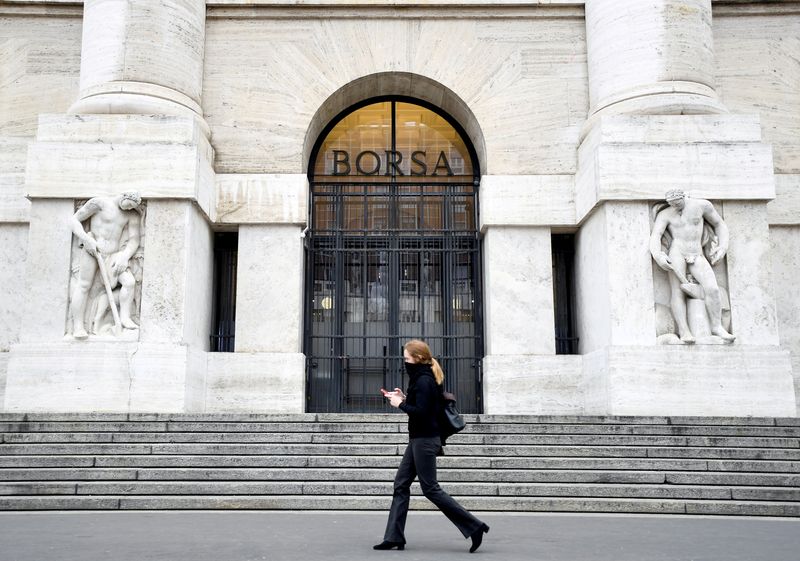
© Reuters. FILE PHOTO: A woman goes past the Italian Stock Exchange in Milan, as the country is hit by the coronavirus outbreak. Italy, February 25, 2020. REUTERS/Flavio Lo Scalzo/File Photo
MILAN (Reuters) – Italy’s right-wing bloc looks set to win a majority in both houses of parliament in next Sunday’s election, at a time when soaring energy prices and rising interest rates create growing challenges for the highly-indebted state.
Giorgia Meloni, leader of the nationalist Brothers of Italy, is seen as frontrunner to become Italy’s first female prime minister. She has said the rightist bloc will respect European Union budget rules but has called for reforms.
The absence of anti-euro rhetoric seen in the 2018 election has reassured investors, for now.
“In the short term we are reassured, but this is the short term,” said OFI Asset Management portfolio manager Charles Haddad.
Here are five key questions for markets.
1/ How will markets react to a win for the right?
Near-term reaction could be muted since a centre-right win is anticipated. At around 225 basis points, the closely watched gap between 10-year Italian and German bond yields has been relatively stable.
Mind the gap https://graphics.reuters.com/ITALY-POLITICS/lgpdwdgrmvo/chart.png
But pressure on bonds could build as focus shifts to budget policy in 2023. While Meloni has talked about abiding by EU budget rules, concern about a potential clash could grow if right-wing parties push for fewer taxes and higher pension spending.
And if the right wins a two-thirds majority in both houses of parliament the constitution could be changed without a referendum. That would cause some angst since the constitution protects issues related to Italy’s EU membership.
Any new government will have little room for rolling back reforms or pursuing “unorthodox” economic policies because of political and market constraints, Scope Ratings warned in a recent report.
Italy’s economic woes https://graphics.reuters.com/ITALY-POLITICS/egpbkrwwdvq/chart.png
2/ Could Italy’s EU funding plan be modified?
The Brothers of Italy sees room to amend Italy’s EU-backed recovery fund programme to account for the energy shock.
To receive the next tranche of the funds in December, Rome needs to reach 55 new targets in the second half of 2022, which a party official has said should be adjusted. Brussels has said only a fine-tuning of the agreed recovery plan is possible.
The party has said it won’t jeopardise access to the programme but changing plans may put the funds, worth 19 billion euros ($18.93 billion) or 1% of GDP, at risk, said Rabobank economist Maartje Wijffelaars.
3/ What does a new government mean for Italian debt?
Italy is one of the world’s most indebted states, with debt as a share of gross domestic product at 151%.
The debt ratio, expected to fall this year, could rise if EU fund payments fall short, hurting economic growth.
Italy’s ballooning debt https://graphics.reuters.com/ITALY-POLITICS/egvbkrwggpq/chart.png
Concern about Italian debt has sent 10-year bond yields higher to 4%. Moody’s (NYSE:) and S&P cut their outlook for Italy’s rating after Mario Draghi quit as Prime Minister in July.
“I hope the first warnings we have already seen (from ratings agencies) are not a harbinger of something bad for the sovereign rating, as that would be real trouble for whoever leads the country,” said Alessandro Tentori, CIO at AXA Investment Managers Italy.
4/ Could the European Central Bank activate its anti-fragmentation tool?
Rising borrowing costs in highly-indebted Italy are testing the ECB’s resolve to contain bond market strain.
Italy’s election had been seen as a near-term obstacle to the ECB activating its Transmission Protection Instrument (TPI)- a new tool to prevent weaker states’ borrowing costs diverging too far from top-rated Germany through no fault of their own.
The ECB is not expected to use the TPI soon, but its presence should help support Italian bonds.
“We should not underestimate the willingness of the ECB to avoid fragmentation,” said Amundi group chief investment officer Vincent Mortier, adding that a move in the bond spread towards 300 bps would be a “buy signal” for Italy.
5/ What will the results mean for Italian banks?
The sector is in better shape versus the 2018 election when populist parties’ anti-euro rhetoric rattled investors.
Italian banks have a stronger capital base and are less exposed to sovereign stress than they were a decade ago. Cheap valuations, rising rates and Meloni’s reassuring EU-friendly comments also mean Italian lenders look attractive.
But the economic outlook will ultimately hold sway and with recession risks growing, betting on banks is risky, analysts say.
Italy’s economic woes https://graphics.reuters.com/ITALY-POLITICS/lgpdwdgakvo/chart.png
($1 = 1.0036 euros)


Be the first to comment